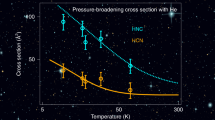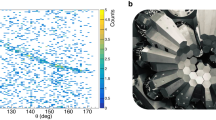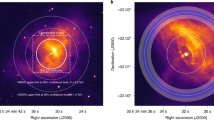Abstract
THE note which was added in proof by Menzel to his letter in NATURE regarding the effect of collisions on the intensities of nebular lines1 prompts me to make the following remarks. In presenting the results to which he refers to the San Diego meeting of the Astronomical Society of the Pacific last June, I pointed out that a probable reason for the increase in intensity with pressure of the forbidden transitions in nitrogen is that the rate of production of the metastable states increases more rapidly with pressure than does the rate of de-excitation. It is quite probable that the process of excitation of the metastable nitrogen molecules and atoms in the afterglow is a much more complex process than the production of excited states in nebulæ.
This is a preview of subscription content, access via your institution
Access options
Subscribe to this journal
Receive 51 print issues and online access
$199.00 per year
only $3.90 per issue
Buy this article
- Purchase on Springer Link
- Instant access to full article PDF
Prices may be subject to local taxes which are calculated during checkout
Similar content being viewed by others
References
Menzel, D. H., NATURE, 142, 644 (1938).
Author information
Authors and Affiliations
Rights and permissions
About this article
Cite this article
KAPLAN, J. Excitation of Nebular Lines. Nature 143, 164–165 (1939). https://doi.org/10.1038/143164b0
Issue Date:
DOI: https://doi.org/10.1038/143164b0
This article is cited by
Comments
By submitting a comment you agree to abide by our Terms and Community Guidelines. If you find something abusive or that does not comply with our terms or guidelines please flag it as inappropriate.



